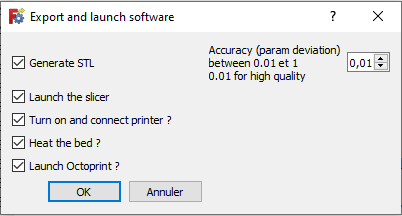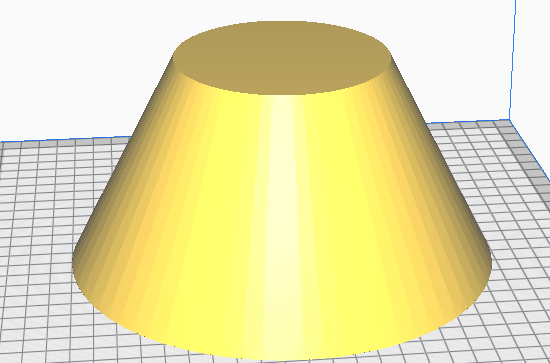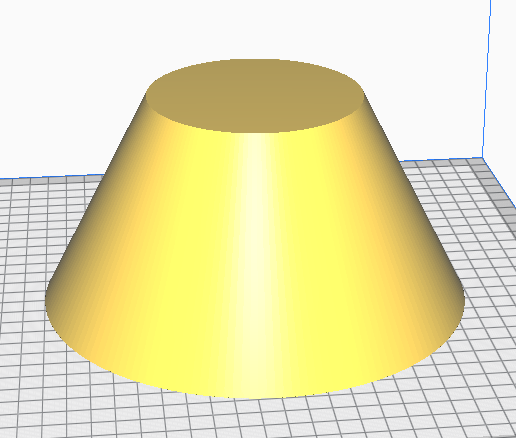Macro 3D Printer Workflow
| Description |
|---|
| Macro that creates an stl file with perfect rounding, i.e. without visible facets, from selected objects. It also allows to launch programs of your choice. For example to automate the FreeCAD → Slicer → printing workflow. After the creation of the stl file you can, for example, open your slicer with the stl file, switch on your printer, heat the printer bed and, if necessary, trigger additional commands in your home automation. |
| Author |
| 2cv001 |
| Download |
| ToolBar icon |
| Links |
| Macros recipes How to install macros How to customize toolbars |
| Macro Version |
| 00.02 |
| Date last modified |
| 2025-12-25 |
| FreeCAD Version(s) |
| All |
| Default shortcut |
| None |
| See also |
| None |
Description
This macro creates an stl file with perfect rounding, i.e. without visible facets, from selected parts. It also allows to launch programs of your choice. For example to automate the FreeCAD → Slicer → printing workflow.
After the creation of the stl file you can, for example, open your slicer with the stl file, switch on your printer, heat the printer bed and, if necessary, trigger additional commands in your home automation.
Principle of smoothing
With visible facets
Without visible facets
The macro modifies the deviation property of the solids before creating the stl file and restores the original values afterwards. Next it can launch the stl file which will open for example under Cura, if the stl extension has been associated with that program on your operating system.
Launching other programs or commands
The macro can launch additional programs or commands that you might enter in a terminal:
- Turn on the printer and the light (requires a computer controlled socket).
- Connect Octoprint to the printer.
- Start preheating the printer bed.
- Save your FreeCAD and stl file somewhere.
Setup
Check that the stl extension is associated with your slicer on your operating system. In other words, when you double-click an stl file your slicer should open and load your stl file.
If you run the macro as it is, it will just create the stl without visible facets, but no others programs will be launched. For that you have to edit the lines of code that come after commands=[ in the section Parameters that can be changed. Have a look at the comments in the Code.
Usage
- Select one or more solid objects to print.
- Start the macro.
- The dialog opens:

- Check the desired options in the left column.
- Enter the Accuracy (param deviation):
- 0.5 is the default value in FreeCAD.
- 0.05 allows a stronger smoothing.
- 0.01 is perfect from a smoothing point of view.
- Press the OK button.
The lower the deviation, the better the quality, but the larger the size of the stl file. The value must be between 0 and 1
Links
Credits
Thanks to openBrain for the help on the code. Very good teacher!
Thanks to Mario 52, David69 and Roy_043 for the help on this wiki.
Script
Code
ver 00.03 2025/12/25 by 2cv001 3D_Printer_Workflow.FCMacro
#!/usr/bin/env python
# -*- coding: utf-8 -*-
# ==================================================================
# ==================================================================
# == ==
# == Workflow to print with "stl" file with perfect rounding ==
# == and launch others programs ==
# == ==
# ==================================================================
# ==================================================================
__author__ = "2cv001"
__title__ = "Macro_3D_Printer_Workflow"
__date__ = "2025/12/25" #YYYY/MM/DD
__version__ = __date__
__icon__ = "https://wiki.freecad.org/images/b/b4/Macro_3D_Printer_Workflow.png"
__Wiki__ = "https://wiki.freecad.org/Macro_3D_Printer_Workflow"
"""
Macro that creates an "stl" file with perfect rounding
= without visible facets.
It also allows to launch programs of your choice
For example to automate the FreeCAD -> Slicer -> printing workflow
Principle of smoothing : it modifies the deviation property of the solids before
generation of the stl and then replace the old values
At the end, it proposes to launch the stl file which will open for example under
cura if the stl extension has been associated with cura in your operating system.
Launching other programs or commands :
You can ask it to chain any program or command that you might
type in a terminal.
To do this, you must change what is in the
"parameters that can be changed" section.
Examples of applications:
- Turn on the printer and the light (requires for example a controlled socket)
- Connect octoprint to the printer
- Start the tray preheating
- Save your FreeCAD and stl file
....
Tested on windows and Linux
"""
import FreeCAD as App
import Mesh
from PySide import QtCore, QtWidgets
import os, sys, subprocess
import time
import FreeCADGui as Gui
#================================
# Parameters that can be changed
#================================
# Smoothing management
#--------------------
# deviation : default value that will be displayed in the dialog box.
# 0.5 is the default value in FreeCad, 0.05 allows a stronger smoothing.
# 0.01 is perfect from a smoothing point of view.
# The lower the value, the better the quality,
# but the larger the size of the stl file
# the value must be between 0 and 1
deviation=0.01
doitLancerFichier=False # if True, it will be proposed to launch the stl otherwise put False
# Automatic program launch,
# Automation of the production line
#------------------------------------------
delaiMax=10 # if the user enters a delay greater than this value,
# it will be reduced to delaiMax
#To launch programs of your choice
#------------------------------------------
#Typically for example a home automation program,
#turn on your printer or/and a light etc.
#Use the following syntax by adding after the line "# insert your lines here" a line
# with this syntax (important: align the [ with the others):
# [ ['command to execute', 'param 1', param 2, ] ,'.extension','question to ask', waiting time, checked by default]
# Details of the syntax :
# 'command to execute' : the command you want to execute.
# 'param 1, param 2,...' : if your program needs parameters.
# These parameters will be taken into account only if extension=''.#
# 'extension': if not empty then the first parameter will be replaced by the name of
# your FreeCAD file but with this extension.
# 'question to ask': the question to display in the dialog box
# time_wait : optional : nb of seconds to wait after execution
# allows for example to wait for the printer to start before asking it to heat the plate
# 'checked by default' False if you whant it unchecked by default
# Note in the examples below the double \ in place of \ (because the special characters
# must be preceded by an \ in python). Ditto for the apostrophe for example
# the lines in question are to be inserted further down after commands=[...
#
# Examples of possible launches:
"""
Launching a program :
----------------------
to launche a program without parameter
[ ['calc.exe' ] ,'' ,'Launch the calculator ?'],
to launche a program with a parameter (here : dessin.jpg)
[ ['C:\\WINDOWS\\system32\\mspaint.exe','dessin.jpg' ] ,'' ,'Launch Paint ?' ],
to launche a program with an extension parameter. If for example,
the freecad project file name is 'mondessin.FCStd'
and if you give '.stl' as extension, the program will be launched with as first parameter 'mondessin.stl'
Here cura will be launched with the file 'modessin.stl' loaded :
[ ['C:\\Program Files\\Ultimaker Cura 4.8.0\\Cura.exe'] ,'.stl','Launch Cura ?' ],
to load an url in firefox. Here, to launch octopi in firefox.
[ ['C:\\Program Files\\Mozilla Firefox\\firefox.exe','https://octopi.local'],'','Launch Octoprint ?'],
On linux:
[ [ 'firefox','https://octopi.local' ] , '' ,'Launch Octoprint ?' ],
Launching a web page (here, a php script) :
-----------------------------------------
[ ['curl','http://pidomotique/connecte.php' ] , '' ,'Connect the printer ?'],
Launching an url using https but insecure
[ ['curl','https://pidomotique/connecte.php,'--insecure'] , '' ,'Connect the printer ?'],
And if we want a delay of 10 seconds before the following program is executed: :
[ ['curl','https://pidomotique/connecte.php,'--insecure'] , '' ,'Connect the printer ?',10],
Example of printer control via octoprint (f you have it...):
send a G-code (see https://marlinfw.org/meta/gcode/ for others G-codes)
here : temperature setting of the plate
- Replace the XXX after X-Api-Key: by your API key (found in the octoprint parameters)
- Replace http://octopi.local by the url with which you access octoprint
- Change the value 050 in "M140 S050". S050 indicates that you need to heat to 50°.
if you want 60°, replace S050 by S060
- 2 lines to copy after having adapted it:
[ [ 'curl','-H', 'Content-Type: application/json','-H', 'X-Api-Key: XXXXXXXXXXXXXXXXXXXXX', '-X', 'POST',
'-d {"command":"M140 S050"}','http://octopi.local/api/printer/command' ] , '','Warm up the printer plate ?' ],
"""
commandes=[
# insert your lines here.
# [ ['calc.exe' ] ,'' ,'Lancer la calculatrice ?',2],
# [ ['C:\\Program Files\\Ultimaker Cura 5.2.1\\Ultimaker-Cura.exe'] ,'.stl','Lancer Cura ?' ],
# [ ['curl','http://pidomotique/connecte.php' ] , '' ,'Allumer et connecter l\'imprimante ?',4],
# [ [ 'curl','-H', 'Content-Type: application/json','-H', 'X-Api-Key: XXXXXXXXXXXXXXXXXXXXX', '-X', 'POST',
# '-d {"command":"M140 S050"}','http://octopi.local/api/printer/command' ] , '','Warm up the printer plate ?' ],
# 2 jeedom command that I use. Put a # at the begining of the 2 lines.
[ ['curl', 'https://pijeedom/core/api/jeeApi.php?apikey=xxxxxxxxxxxxxxxxxxxxxxxxxxxxxx&type=cmd&id=4042','--insecure' ] , '' ,'Turn on and connect printer ?',10],
[ ['curl','https://pijeedom/core/api/jeeApi.php?apikey=xxxxxxxxxxxxxxxxxxxxxxxxxxxxxxxxxx&type=cmd&id=4048','--insecure' ] , '' ,'Heat the bed ?'],
[ ['C:\\Program Files\\Mozilla Firefox\\firefox.exe','https://octopi'],'','Launch Octoprint ?'],
]
#===============
#Initialisations
#===============
dictionnaireOrigineDeviation={}
mw = Gui.getMainWindow()
indiceCommandeEtParam=0
indiceExtFileNameParamCommandeALancer=1
indiceTextAutreCommandeALancer=2
indiceDelai=3
indiceCheckedCommandeAlancer=4
# UI Class definitions
class BoiteDialogueSTLGuiClass(QtWidgets.QDialog):
def __init__(self, parent=None):
super(BoiteDialogueSTLGuiClass, self).__init__(parent)
self.initUI()
def initUI(self):
self.tabCheckboxTextCommandes=[] # table of checkbox commands to run
self.setGeometry( 250, 250, 400, 150)
self.setWindowTitle("Export and launch software")
lay = QtWidgets.QGridLayout(self)
# checkboxs
self.checkboxGenererSTL = QtWidgets.QCheckBox("Generate STL ?", self)
self.checkboxGenererSTL.setCheckState(QtCore.Qt.Checked)
lay.addWidget(self.checkboxGenererSTL, 0, 0)
self.checkboxLancerSTL = QtWidgets.QCheckBox("Launch the slicer ?", self)
self.checkboxLancerSTL.setCheckState(QtCore.Qt.Checked)
lay.addWidget(self.checkboxLancerSTL, 2, 0)
if not doitLancerFichier :
self.checkboxLancerSTL.setVisible(False)
self.checkboxLancerSTL.setCheckState(QtCore.Qt.Unchecked)
for posLigne, cmd in enumerate(commandes, start=3):
textCommande=cmd[indiceTextAutreCommandeALancer]
self.checkboxTextCommande = QtWidgets.QCheckBox(textCommande, self)
# storing this checkbox in a table :
self.tabCheckboxTextCommandes.append(self.checkboxTextCommande)
try :
caseChecked=cmd[indiceCheckedCommandeAlancer]
except :
caseChecked=True
self.checkboxTextCommande.setCheckState(QtCore.Qt.Checked if caseChecked else QtCore.Qt.Unchecked)
lay.addWidget(self.checkboxTextCommande, posLigne, 0)
# numeric input field
self.label2 = QtWidgets.QLabel('Accuracy (param deviation)\nbetween 0.01 and 1\n' +
'0.01 for high quality', self)
lay.addWidget(self.label2, 0, 1)
self.precision = QtWidgets.QDoubleSpinBox(self)
self.precision.setValue(deviation)
self.precision.setRange(0.01,1)
self.precision.setSingleStep(0.01)
self.precision.setToolTip('The larger the number, the larger the file size\n' +
'and the better the accuracy.\n' +
'See the deviation parameter in FreeCAD')
lay.addWidget(self.precision, 0, 2)
butBox = QtWidgets.QDialogButtonBox(self)
butBox.setOrientation(QtCore.Qt.Horizontal)
butBox.setStandardButtons(QtWidgets.QDialogButtonBox.Cancel | QtWidgets.QDialogButtonBox.Ok)
lay.addWidget(butBox)
butBox.accepted.connect(self.accept)
butBox.rejected.connect(self.reject)
self.setLayout(lay)
#===============
#functions
#===============
def octopi(api,commande,urlOctopi,apiKey) :
"""
Function that returns the parameter to pass to subprocess.Popen if you
want to run an octopi API. Not used here. But for memory purposes
and a future evolution
Arguments :
api : the api to run ex: '/api/printer/command'
commande : the command of the API in question ex: '{"command": "M140 S050"}'
urlOctoprint : the url of your octopi ex : 'https://octopi.local'
apiKey : the API key you find in setting/API of octoprint
Returns :
Example
API running a gcode. Here the heating of the printer plate
subprocess.Popen(
octopi(
'/api/printer/command',
'{"command":"M140 S050"}',
'https://octopi.local',
'XXXXKEYXAPIXXXXXXXX'))
,close_fds=True)
"""
commandeCurl=[
'curl','-H', 'Content-Type: application/json','-H',
'X-Api-Key: '+apiKey,
'-X', 'POST',
'-d '+commande,urlOctopi+api
]
return commandeCurl
def nameFileStl(dictionnaireOrigineDeviation,mw=Gui.getMainWindow()):
"""
Function that determines and returns the file name including path
where the stl will be saved
The FreeCAD document containing the dictionary objects must be
opened and saved
Arguments :
dictionaryOrigineDeviation (dictionary) :
a dictionary whose keys are FreeCAD solids.
the filename will be obtained from the filename of the
of the document containing the first object (solid) of this
dictionary
Returns :
'' if the document does not exist,
otherwise the name of the file where the stl will be saved
Example
"""
doc=list(dictionnaireOrigineDeviation.keys())[0].Document
if doc is None:
QtWidgets.QMessageBox.information(mw,'Warning',\
"You do not have a document open")
return ''
if doc.FileName=='':
QtWidgets.QMessageBox.information(mw,
'Warning','Save your document before restarting the order')
return ''
return(os.path.splitext(doc.FileName)[0]+'.stl')
def memoriseObjEtDeviation(selection,deviationImpose):
"""
Memorises the solids that are contained in selection and their
deviation property and replaces it with the value
of deviationImpose
It imposes a subsequent recompute by a touch.
Recompute() must eventually be run after
Arguments :
selection: a selection of objects
deviationImpose (float): value that we want to impose to deviation.
Returns:
a dictionary containing the object in key and the deviation in value
Returns {} if there is no suitable object in the selection
Example:
memoriseObjEtDeviation(Gui.Selection.getSelection(),deviation)
"""
dicoObjDeviation={}
for objData in selection :
if objData.isDerivedFrom('Part::Feature') \
and not objData.isDerivedFrom('PartDesign::Feature')\
and not objData.isDerivedFrom('Part::Part2DObject'):
dicoObjDeviation[objData]=objData.ViewObject.Deviation
objData.ViewObject.Deviation=deviationImpose
# pour imposer un recompute même si la déviation est plus petite
# qu'avant :
objData.touch()
for o in objData.ViewObject.claimChildren():
o.touch()
return dicoObjDeviation
def restitueDeviation(dicoOrigineDeviation):
"""
Function that replaces the deviation property in the objects
It imposes a recompute by a touch. recompute() must be
run after
Arguments:
dicoOrigineDeviation a dictionary containing the object in key
and the value to be imposed in the deviation property of the object
in value
Returns: Does not return anything
Example:
restitueDeviation(dicoOrigineDeviation)
"""
for ob2 in dicoOrigineDeviation:
ob2.ViewObject.Deviation=dicoOrigineDeviation[ob2]
# to impose a recompute even if the deviation is smaller
# than before:
ob2.touch()
for o in ob2.ViewObject.claimChildren():
o.touch()
def openFile(fileName):
"""
function that launches a file depending on the operating system
checked for now only under windows
Arguments:
fileName (string) the name of the file to run
Returns
Does not return anything
Example:
openFile(unfichier.stl)
openFile(calc.exe)
"""
if sys.platform == "win32":
os.startfile(fileName)
else:
opener ="open" if sys.platform == "darwin" else "xdg-open"
subprocess.Popen([opener, fileName],close_fds=True)
def recalcul(dicoObjs):
"""
launches a recompute for each Document of the dico objects
only if it has not already been done
Arguments:
dicoObjs a dictionary containing the object in key
Returns
Does not return anything
Example:
recalcul(dicoMesObjets)
"""
docDejaRecalcul=[]
for obj in dicoObjs:
if obj.Document not in docDejaRecalcul:
obj.Document.recompute()
docDejaRecalcul.append(obj.Document)
def lanceCommmandes(commandesAlancer,fileStlName,formBoiteDialogueSTL):
"""
launch the orders
Arguments:
commandesAlancer in the form of an array of arrays
[ ['command to execute', 'param 1', param 2, ] ,'.extention','question to ask',delay ],
['command to execute', 'param 1', param 2, ] ,'.extention','question to ask',delay ],
...
]
'command to execute' : the command you want to execute.
For example 'myProgram.exe' if need, put also its path.
param 1, param2... ' : if your program needs parameters.
Will only be taken into account if extention=''.
'extention': if not empty, parameter param 1 will be the name of your
FreeCAD file but with your extension :
question to ask': the question to display in the dialog box
delay: waiting time in seconds before going to the next command.
Returns
Do not return anything
Example:
lanceCommmandes(commandes,fileStlName,formBoiteDialogueSTL) # runs the commands described in commands
"""
for tbktc in formBoiteDialogueSTL.tabCheckboxTextCommandes :
if tbktc.isChecked() :
i= formBoiteDialogueSTL.tabCheckboxTextCommandes.index(tbktc)
commande=commandesAlancer[i]
commandeEtParam=commande[indiceCommandeEtParam]
extFileNameParamCommandeALancer=commande[indiceExtFileNameParamCommandeALancer]
textAutreCommandeALancer=commande[indiceTextAutreCommandeALancer]
delai=0
try :
if commande[indiceDelai:indiceDelai+1]!=[] : #if the user has entered a delay
delai=commande[indiceDelai]
except :
print ('Delay not taken into account because of invalid numerical value'+
'for the command '+ textAutreCommandeALancer)
if delai > delaiMax :
delai=delaiMax
if extFileNameParamCommandeALancer!='':
if commandeEtParam[2:3]==[] : # There is no parameter.
# We add a parameter to put our file name
# with our extension.
commandeEtParam.append('')
commandeEtParam[1]= os.path.splitext(fileStlName)[0]+ extFileNameParamCommandeALancer
subprocess.Popen(commandeEtParam,close_fds=True)
time.sleep(delai)# Pause time (seconds)
def run(objs=Gui.Selection.getSelection(), dev=deviation):
"""
main function
Arguments:
doc: the active document
objs : the objects that have been selected beforehand
dev : the value of the deviation property which will be
imposed before the generation of the stl
Returns
Returns nothing
Example:
run()
"""
#check if at least one solid (body and similar) has been selected
nbBody=0
for objData in objs :
if objData.isDerivedFrom('Part::Feature') \
and not objData.isDerivedFrom('PartDesign::Feature')\
and not objData.isDerivedFrom('Part::Part2DObject'):
nbBody=nbBody+1
if nbBody==0: # if we haven't found any solids, we have to have an active one
try:
objs=[]
objs.append(Gui.ActiveDocument.ActiveView.getActiveObject('pdbody'))
response=QtWidgets.QMessageBox.information(mw, 'Warning',\
'-You did not select a solid. Automatic solid selection : '+objs[0].Label +
' by the macro..\n-If not adequate, select one or more solids before running the macro',
QtWidgets.QMessageBox.Ok | QtWidgets.QMessageBox.Cancel )
if response==QtWidgets.QMessageBox.Cancel :
return
except :
QtWidgets.QMessageBox.information(mw, 'Warning',\
'--Select one or more solids before running the macro')
return
# Dialog box of what we want to do
formBoiteDialogueSTL=BoiteDialogueSTLGuiClass(mw)
if not formBoiteDialogueSTL.exec() :
return
dev=formBoiteDialogueSTL.precision.value()
# we memorize the selected solids and their deviation,
# we make a touch() of their child to be taken into account in recompute :
dictionnaireOrigineDeviation=memoriseObjEtDeviation(objs,dev)
if len(dictionnaireOrigineDeviation)==0: # if no solids were found
QtWidgets.QMessageBox.information(mw, 'Warning',\
'-Select one or more solids before running the macro')
return
# we get the name of the file where we have to save the stl
fileStlName=nameFileStl(dictionnaireOrigineDeviation)
if fileStlName == '' :
return
#The solids in dictionaryOriginDeviation are passed as parameters
if formBoiteDialogueSTL.checkboxGenererSTL.isChecked():
Mesh.export(list(dictionnaireOrigineDeviation.keys()), fileStlName)
# restitution of the original property deviation for all solids :
restitueDeviation(dictionnaireOrigineDeviation)
recalcul(dictionnaireOrigineDeviation)
if formBoiteDialogueSTL.checkboxLancerSTL.isChecked():
#runs for example cura if cura has been associated with *.stl files
openFile(fileStlName)
lanceCommmandes(commandes,fileStlName,formBoiteDialogueSTL)
# runs the commands described in commands
if __name__ == '__main__':
run()


